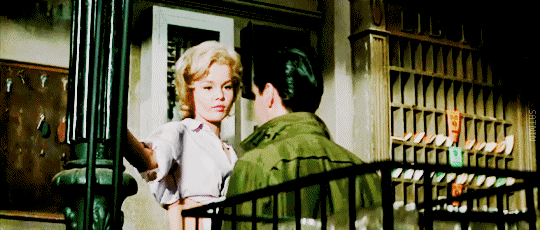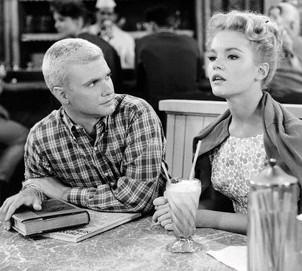Post by petrolino on Aug 27, 2018 0:57:35 GMT
Tuesday WelD's BIRTHDAY BASH
"I do not ever want to be a huge star."
- Tuesday Weld


"From the start, Weld was red meat for the press. By the time she’d been cast in Dobie Gillis she was already taking up whole Hedda Hopper column with her Tuesdays. She had a pretty, coquettish manner even at fifteen, and a habit of saying things like, “The man I marry will have to be richer than I am,” just like her character. Her mother, who doubled as her chaperone and business manager, came along with her to interviews. Their filial bickering made for excellent copy: “Is Tuesday allowed out late at night, say until eleven o’clock, I asked Mr. Weld. ‘Ha, ha,’ roared Mrs. Weld. ‘That’s when she starts out.'”
Her sexuality, however, was what really kept people interested in Weld, and they’d shamelessly comment on it to the press. “From the rear,” said a cameraman quoted in a Washington Post and Times Herald profile, “she looks like Jane Mansfield’s kid sister.” At the time he said this she was, just so we’re clear, 15 years old. All those rumors you hear about the golden days of child stardom when people felt less okay about leering fall apart in Tuesday Weld coverage. She had a habit of dating older men, too, and the optics of a daddy complex are eternally popular with the celebrity press.
Weld treated the hullabaloo with disdain, offering up droll, piercing quips: “I also like to play ball, but no one thinks I should.” Which is not to say she wasn’t prone to the malapropisms of any ordinary starlets. “I have very ambulatory thoughts as to what I am and why,” she said. “I don’t really care. I just am.” She began to give interviews complaining that she’d been supporting her mother and siblings since she was three. And she hinted that she’d had breakdowns and addiction problems from early childhood, dropping details salacious enough to keep everyone’s interest."
Her sexuality, however, was what really kept people interested in Weld, and they’d shamelessly comment on it to the press. “From the rear,” said a cameraman quoted in a Washington Post and Times Herald profile, “she looks like Jane Mansfield’s kid sister.” At the time he said this she was, just so we’re clear, 15 years old. All those rumors you hear about the golden days of child stardom when people felt less okay about leering fall apart in Tuesday Weld coverage. She had a habit of dating older men, too, and the optics of a daddy complex are eternally popular with the celebrity press.
Weld treated the hullabaloo with disdain, offering up droll, piercing quips: “I also like to play ball, but no one thinks I should.” Which is not to say she wasn’t prone to the malapropisms of any ordinary starlets. “I have very ambulatory thoughts as to what I am and why,” she said. “I don’t really care. I just am.” She began to give interviews complaining that she’d been supporting her mother and siblings since she was three. And she hinted that she’d had breakdowns and addiction problems from early childhood, dropping details salacious enough to keep everyone’s interest."
- Michelle Dean, 'Celebrating The Legendary Tuesday Weld On Her 70th Birthday', written for Flavorwire on 27 August, 2013


"Tuesday Weld will not be attending the Film Society of Lincoln Center’s retrospective “American Girl: Tuesday Weld,” running from September 21—25, which will showcase 10 performances by the unconventional actress. Weld hasn’t made a public appearance in more than a decade. Perhaps she’s gone into self-imposed exile a la Marlene Dietrich, wanting to preserve the public’s memory of the brazen, luminous beauty that made her an icon of the ’60s and turned the heads of everyone from Elvis Presley to Pinchas Zukerman. But then again, Weld has made a career of not giving the public what they want, or expect.
From the time she first entered America’s consciousness in the ’50s sitcom The Many Loves of Dobie Gillis, it was obvious that Weld was different from the Sandra Dees of the world, and not just because of her improbable first name. Weld’s apple-pie looks hid a dark, dangerous undercurrent. In her characters, sex and violence were inevitably linked. Her persona was innocent yet amoral—a fille fatale. Weld was Kubrick’s first choice for Lolita, but she turned him down, later claiming “I didn’t have to play it. I was Lolita.”
Weld is as famous for what she could have been as for what she was. In addition to Lolita, Weld was first choice for the lead female parts in Bonnie and Clyde, Rosemary’s Baby, Bob and Carol and Ted and Alice, Cactus Flower, and True Grit, turning them all down. Critics at the time accused her of exercising poor judgment, but according to Weld herself, the real reason for her choices was more complicated.
“Do you think I want a success?” she said in a ’71 New York Times interview. “I refused Bonnie and Clyde because I was nursing at the time, but also because deep down I knew it was going to be a huge success. The same was true of Bob and Carol and Fred and Sue or whatever it was called. It reeked of success.”
Despite her pinup origins, Weld has shown herself to be one of the most singular film acting talents of the last 50 years. According to critic David Ehrenstein, “Tuesday Weld’s genius is that she never seems to be acting. She always looks like she is simply that way, whether the film be…Sex Kittens Go to College, or (Sergio Leone’s epic) Once Upon a Time in America.”
From the time she first entered America’s consciousness in the ’50s sitcom The Many Loves of Dobie Gillis, it was obvious that Weld was different from the Sandra Dees of the world, and not just because of her improbable first name. Weld’s apple-pie looks hid a dark, dangerous undercurrent. In her characters, sex and violence were inevitably linked. Her persona was innocent yet amoral—a fille fatale. Weld was Kubrick’s first choice for Lolita, but she turned him down, later claiming “I didn’t have to play it. I was Lolita.”
Weld is as famous for what she could have been as for what she was. In addition to Lolita, Weld was first choice for the lead female parts in Bonnie and Clyde, Rosemary’s Baby, Bob and Carol and Ted and Alice, Cactus Flower, and True Grit, turning them all down. Critics at the time accused her of exercising poor judgment, but according to Weld herself, the real reason for her choices was more complicated.
“Do you think I want a success?” she said in a ’71 New York Times interview. “I refused Bonnie and Clyde because I was nursing at the time, but also because deep down I knew it was going to be a huge success. The same was true of Bob and Carol and Fred and Sue or whatever it was called. It reeked of success.”
Despite her pinup origins, Weld has shown herself to be one of the most singular film acting talents of the last 50 years. According to critic David Ehrenstein, “Tuesday Weld’s genius is that she never seems to be acting. She always looks like she is simply that way, whether the film be…Sex Kittens Go to College, or (Sergio Leone’s epic) Once Upon a Time in America.”
- Louis Jordan discusses the Lincoln Center's controversial Tuesday Weld retrospective, Slant

Sheila Kuehl on working with Tuesday Weld and Warren Beatty on 'The Many Loves Of Dobie Gillis'; recorded for the Archive of American Television
Tuesday Weld : Mini-Gallery


'Girlfriend' - Matthew Sweet
Happy Birthday!!

















